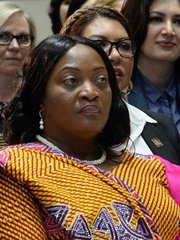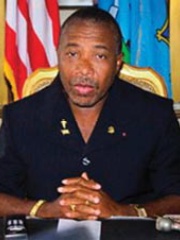
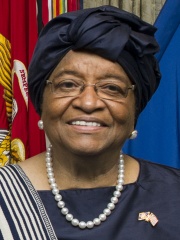
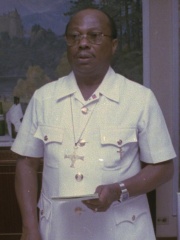
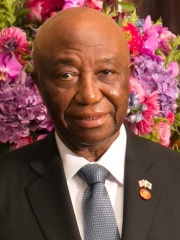
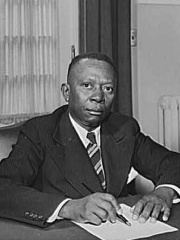
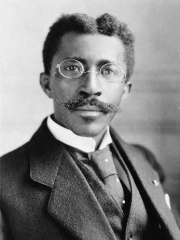
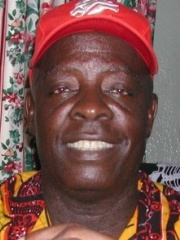
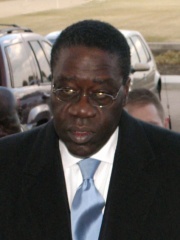
The Most Famous
POLITICIANS from Liberia
This page contains a list of the greatest Liberian Politicians. The pantheon dataset contains 19,576 Politicians, 12 of which were born in Liberia. This makes Liberia the birth place of the 140th most number of Politicians behind Republic of the Congo, and Trinidad and Tobago.
Top 10
The following people are considered by Pantheon to be the top 10 most legendary Liberian Politicians of all time. This list of famous Liberian Politicians is sorted by HPI (Historical Popularity Index), a metric that aggregates information on a biography's online popularity. Visit the rankings page to view the entire list of Liberian Politicians.

1. Charles Taylor (b. 1948)
With an HPI of 74.24, Charles Taylor is the most famous Liberian Politician. His biography has been translated into 46 different languages on wikipedia.
Charles McArthur Ghankay Taylor (born 28 January 1948) is a Liberian former politician. He served as the 22nd president of Liberia from 2 August 1997 until his resignation on 11 August 2003 as a result of the Second Liberian Civil War and growing international pressure. After leaving office, he was found guilty of war crimes committed in the Sierra Leone Civil War, and was sentenced to 50 years in prison. Born in Arthington, Montserrado County, Liberia, Taylor earned a degree at Bentley College in the United States before returning to Liberia to work in the government of Samuel Doe. After being removed for embezzlement and imprisoned by President Doe, Taylor escaped prison in 1989. He eventually arrived in Libya, where he was trained as a guerrilla fighter. He returned to Liberia in 1989 as the head of a Libyan-backed rebel group, the National Patriotic Front of Liberia, to overthrow the Doe government, initiating the First Liberian Civil War (1989–1996). Following Doe's execution, Taylor gained control of a large portion of the country and became one of the most prominent warlords in Africa. His forces, along with those of other rival warlords such as ULIMO, were notorious for committing widespread human rights abuses and atrocities during the civil war. Following a peace deal that ended the war, Taylor was elected president in the 1997 general election as a member of the National Patriotic Party (NPP). During his term in office, Taylor was accused of war crimes and crimes against humanity as a result of his support for the Revolutionary United Front (RUF) rebel group in the Sierra Leone Civil War (1991–2002). Domestically, Taylor attempted to consolidate power through dictatorial means such as by purging the military and committing violence against his political rivals, including an assassination attempt of former ULIMO commander Roosevelt Johnson, leading to violent clashes in Monrovia in 1998. As a result, opposition to his government grew, culminating in the outbreak of the Second Liberian Civil War in 1999. By 2003, Taylor had lost control of much of the countryside and was formally indicted by the Special Court for Sierra Leone. That year, he resigned as a result of growing international pressure and went into exile in Nigeria. In 2006, the newly elected president of Liberia, Ellen Johnson Sirleaf, formally requested his extradition. He was detained by UN authorities in Sierra Leone and then at the Penitentiary Institution Haaglanden in The Hague, awaiting trial by the Special Court. He was found guilty in April 2012 of all eleven charges levied by the Special Court, including terror, murder and rape. In May 2012, Taylor was sentenced to 50 years in prison. Reading the sentencing statement, Presiding Judge Richard Lussick said: "The accused has been found responsible for aiding and abetting as well as planning some of the most heinous and brutal crimes in recorded human history."

2. Ellen Johnson Sirleaf (b. 1938)
With an HPI of 73.40, Ellen Johnson Sirleaf is the 2nd most famous Liberian Politician. Her biography has been translated into 104 different languages.
Ellen Eugenia Johnson Sirleaf (born 29 October 1938) is a Liberian politician who served as the 24th president of Liberia from 2006 to 2018. Sirleaf was the first elected female head of state in Africa. Sirleaf was born in Monrovia to a Gola father and Kru-German mother. She was educated at the College of West Africa. She completed her education in the United States, where she studied at Madison Business College, the University of Colorado Boulder, and Harvard University. She returned to Liberia to work in William Tolbert's government as Deputy Minister of Finance from 1971 to 1974. Later, she worked again in the West, for the World Bank in the Caribbean and Latin America. In 1979, she received a cabinet appointment as Minister of Finance, serving to 1980. After Samuel Doe seized power in 1980 in a coup d'état and executed Tolbert, Sirleaf fled to the United States. She worked for Citibank and then the Equator Bank. She returned to Liberia to contest a senatorial seat for Montserrado County in 1985, an election that was disputed. She was arrested as a result of her open criticism of the military government in 1985 and was sentenced to ten years imprisonment, although she was later released. Sirleaf continued to be involved in politics. She finished in second place at the 1997 presidential election, which was won by Charles Taylor. She won the 2005 presidential election and took office on 16 January 2006. She was re-elected in 2011. She was the first woman in Africa elected as president of her country. She won the Nobel Peace Prize in 2011, in recognition of her efforts to bring women into the peacekeeping process. She has received numerous other awards for her leadership. In June 2016, Sirleaf was elected as the Chair of the Economic Community of West African States, making her the first woman to hold the position since it was created.

3. William Tolbert (1913 - 1980)
With an HPI of 71.41, William Tolbert is the 3rd most famous Liberian Politician. His biography has been translated into 38 different languages.
William Richard Tolbert Jr. (13 May 1913 – 12 April 1980) was a Liberian politician who served as the 20th president of Liberia from 1971 until his assassination in 1980. Tolbert was an Americo-Liberian and trained as a civil servant before entering the House of Representatives in 1943 for the True Whig Party, then the only established party in Liberia. Tolbert was elected the 23rd vice president of Liberia to William Tubman in 1952 and served in that position until he became president following Tubman's death in 1971. Tolbert's early presidency saw liberal reforms and the adoption of a Non-Alignment stance, but growing economic troubles and tensions between Americo-Liberians and indigenous Liberians led to instability. Tolbert was assassinated in the 1980 coup d'état by the People's Redemption Council led by Samuel Doe, marking the end of 133 years of Americo-Liberian rule in Liberia.

4. Joseph Boakai (b. 1944)
With an HPI of 65.25, Joseph Boakai is the 4th most famous Liberian Politician. His biography has been translated into 32 different languages.
Joseph Nyuma Boakai (born 30 November 1944) is a Liberian politician who has served as the 26th president of Liberia since 2024. He previously served as the 29th vice president of Liberia from 2006 to 2018, under President Ellen Johnson Sirleaf and as the minister of agriculture from 1983 to 1985. Boakai ran for president in 2017, losing the election to George Weah. He went on to defeat Weah in the 2023 election.
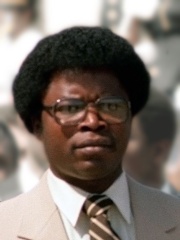
5. Samuel Doe (1951 - 1990)
With an HPI of 63.68, Samuel Doe is the 5th most famous Liberian Politician. His biography has been translated into 44 different languages.
Samuel Kanyon Doe (6 May 1951 – 9 September 1990) was a Liberian politician and military officer who served as the 21st President of Liberia from 1986 to 1990. He ruled Liberia as Chairman of the People's Redemption Council (PRC) from 1980 to 1986 and then as president from 1986 to 1990. A member of the Krahn ethnic group, Doe was a master sergeant in the Armed Forces of Liberia (AFL) when he staged the violent 1980 coup d'état that overthrew President William Tolbert and the True Whig Party, becoming the first non-Americo-Liberian leader of Liberia and ending 133 years of Americo-Liberian rule. Doe suspended the Constitution of Liberia, assumed the rank of general, and established the PRC as a provisional military government with himself as de facto head of state. Doe dissolved the PRC in 1984 and attempted to legitimize his regime, with a new democratic constitution and a general election held in 1985. He won with 51% of the votes, but the election had widespread allegations of election fraud. Doe opened Liberian ports to Canadian, Chinese, and European ships, which brought in considerable foreign investment and earned Liberia's reputation as a tax haven. Doe had support from the United States due to his anti-Soviet stance during the Cold War. Doe's rule was characterized by authoritarianism, corruption, favoritism towards fellow Krahns, and persecution of the Gio and Mano tribes, particularly after surviving a coup attempt in 1985, which led to growing opposition to his regime from the Liberian public and the United States. The First Liberian Civil War began in December 1989 when the anti-Doe National Patriotic Front of Liberia (NPFL) led by Charles Taylor invaded Liberia from the Ivory Coast to overthrow him. The following year, Doe was captured and executed by the Independent National Patriotic Front of Liberia (INPFL), an NPFL splinter group led by Prince Johnson.

6. William Tubman (1895 - 1971)
With an HPI of 59.79, William Tubman is the 6th most famous Liberian Politician. His biography has been translated into 37 different languages.
William Vacanarat Shadrach Tubman (29 November 1895 – 23 July 1971) was a Liberian politician. He was the 19th president of Liberia and the longest-serving president in the country's history, serving from his election in 1944 until his death in 1971. Tubman is regarded as the "father of modern Liberia" in that during his presidency sufficient foreign investment was attracted to modernize the country's economy and infrastructure. During his tenure, Liberia experienced a period of prosperity. He also led a policy of national unification to reduce the social and political differences between his fellow Americo-Liberians and the indigenous Liberians.

7. Charles D. B. King (1875 - 1961)
With an HPI of 58.12, Charles D. B. King is the 7th most famous Liberian Politician. His biography has been translated into 23 different languages.
Charles Dunbar Burgess King (12 March 1875 – 4 September 1961) was a Liberian politician who served as the 17th president of Liberia from 1920 to 1930. He was of Americo-Liberian and Sierra Leone Creole descent. He was a member of the True Whig Party, which ruled the country from 1878 until 1980. King was Attorney General from 1904 until 1912, and Secretary of State of Liberia from 1912 until he was elected president in 1919. In this capacity, he attended the 1919 Paris Peace Conference and the accompanying First Pan-African Congress. Though a moderate supporter of reform, he continued to support the patronage machine and corrupt dominance of the True Whig Party. President King's administration was marked by scandal. His economic agenda and development plan consistently fell short of expectations; and while literacy rates increased with broader access to public education, his presidency is best known for a string of political scandals and economic setbacks. In 1927, he won a sham presidential election, similar to the one he had won in 1923, with official results showing over 15 times more votes for him than there were electors. A forced labor and slavery scandal forced his resignation in 1930. Charles King resigned in disgrace and retired from seeking higher office thereafter until his death. His presidency was marked by extreme corruption, nepotism for the hiring of officials rather than by skill, and a lack of transparency regarding the decisions his administration was making regarding the welfare of the people and use of slave labor.

8. Moses Blah (1947 - 2013)
With an HPI of 56.03, Moses Blah is the 8th most famous Liberian Politician. His biography has been translated into 24 different languages.
Moses Zeh Blah (18 April 1947 – 1 April 2013) was a Liberian politician. He served as the 28th vice president of Liberia under President Charles Taylor and became the 23rd president of Liberia on 11 August 2003, following Taylor's resignation. He served as president for two months, until 14 October 2003, when a United Nations-backed transitional government, headed by Gyude Bryant, was established.

9. Gyude Bryant (1949 - 2014)
With an HPI of 55.35, Gyude Bryant is the 9th most famous Liberian Politician. His biography has been translated into 27 different languages.
Charles Gyude Bryant (17 January 1949 – 16 April 2014) was a Liberian politician and businessman. He served as the Chairman of the Transitional Government of Liberia from 14 October 2003 to 16 January 2006. The installation of the transitional government was part of the peace agreement to end the country's second civil war, which had raged since the Liberians United for Reconciliation and Democracy (LURD) rebelled against President Charles Taylor in 1999. Bryant was previously a businessman and was chosen as chairman because he was seen as politically neutral and therefore acceptable to each of the warring factions, which included LURD, the Movement for Democracy in Liberia (MODEL), and loyalists of former President Taylor. He was a prominent member of the Episcopal Church of Liberia, and was critical of the governments of both Samuel Doe (1980–90) and Charles Taylor (1997–2003). Ellen Johnson Sirleaf won the 2005 elections and took office in January 2006, succeeding Bryant. He died on 16 April 2014 at the John F. Kennedy Medical Center in Monrovia.
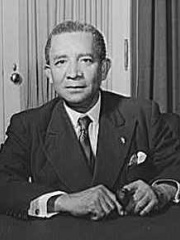
10. Edwin Barclay (1882 - 1955)
With an HPI of 54.58, Edwin Barclay is the 10th most famous Liberian Politician. Her biography has been translated into 22 different languages.
Edwin James Barclay (5 January 1882 – 6 November 1955) was a Liberian politician, poet, and musician who served as the 18th president of Liberia from 1930 until 1944. He was a member of the True Whig political party, which dominated the political governance of the country for decades. Under Barclay's leadership, Liberia was an ally of the United States during World War II.
People
Pantheon has 12 people classified as Liberian politicians born between 1875 and 1963. Of these 12, 4 (33.33%) of them are still alive today. The most famous living Liberian politicians include Charles Taylor, Ellen Johnson Sirleaf, and Joseph Boakai. The most famous deceased Liberian politicians include William Tolbert, Samuel Doe, and William Tubman. As of April 2024, 1 new Liberian politicians have been added to Pantheon including Jewel Taylor.
Living Liberian Politicians
Go to all RankingsCharles Taylor
1948 - Present
HPI: 74.24
Ellen Johnson Sirleaf
1938 - Present
HPI: 73.40
Joseph Boakai
1944 - Present
HPI: 65.25
Jewel Taylor
1963 - Present
HPI: 48.69
Deceased Liberian Politicians
Go to all RankingsWilliam Tolbert
1913 - 1980
HPI: 71.41
Samuel Doe
1951 - 1990
HPI: 63.68
William Tubman
1895 - 1971
HPI: 59.79
Charles D. B. King
1875 - 1961
HPI: 58.12
Moses Blah
1947 - 2013
HPI: 56.03
Gyude Bryant
1949 - 2014
HPI: 55.35
Edwin Barclay
1882 - 1955
HPI: 54.58
Amos Sawyer
1945 - 2022
HPI: 53.37
Newly Added Liberian Politicians (2025)
Go to all RankingsOverlapping Lives
Which Politicians were alive at the same time? This visualization shows the lifespans of the 8 most globally memorable Politicians since 1700.

